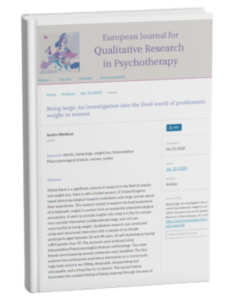Understanding Eating Disorders and Body Image Issues
Eating disorders and body image issues are complex and deeply personal struggles that affect millions of people worldwide. According to research, approximately 1.25 million people in the UK are currently battling an eating disorder (Priory Group).
These conditions are not just about food—they are often rooted in trauma, anxiety, perfectionism, and low self-worth.
Eating disorders present in various forms, each with its own challenges and psychological underpinnings. Below are some of the most commonly recognised disorders:
Anorexia Nervosa
One of the most well-known eating disorders, anorexia nervosa, is characterised by extreme food restriction, an intense fear of gaining weight, and a distorted perception of body image.
Individuals may engage in excessive exercise, restrictive eating, or other behaviours to maintain an unhealthily low body weight. The physical consequences of anorexia include severe malnutrition, weakened bones, organ damage, and even fatality in extreme cases.
Bulimia Nervosa
Bulimia nervosa involves recurrent cycles of binge eating followed by compensatory behaviours such as self-induced vomiting, excessive exercise, or the misuse of laxatives. Those who struggle with bulimia often feel trapped in a cycle of shame, guilt, and loss of control.
Although their weight may remain within a “normal” range, the physical toll—such as electrolyte imbalances, gastrointestinal damage, and heart complications—can be severe.
Binge Eating Disorder (BED)
Binge eating disorder is the most common eating disorder, particularly in the UK and the US. Individuals with BED consume large amounts of food in a short period, often in secret, and experience deep emotional distress.
Unlike bulimia, there is no compensatory purging behaviour, leading to potential health risks such as obesity, diabetes, and cardiovascular disease. This disorder is deeply intertwined with feelings of shame and low self-worth.
Avoidant/Restrictive Food Intake Disorder (ARFID)
ARFID differs from other eating disorders in that it is not necessarily linked to body image concerns.
Instead, individuals experience extreme food avoidance due to sensory sensitivities, fear of choking, or aversions developed from traumatic experiences. This disorder can lead to severe nutritional deficiencies, developmental delays in children, and social isolation.
Body Dysmorphic Disorder (BDD)
While not strictly classified as an eating disorder, BDD is a condition that frequently coexists with disordered eating. Those with BDD become preoccupied with perceived flaws in their appearance—flaws that are often unnoticeable to others.
This obsessive focus can lead to excessive grooming, compulsive mirror-checking, and in some cases, extreme cosmetic surgeries.
Understanding these conditions is the first step towards healing. At Colchester Counselling and Psychotherapy Practice, we offer tailored support to help individuals regain a healthy relationship with their body and food.
How Therapy Helps with Eating Disorders and Body Image Issues
The road to recovery from an eating disorder or body image issue requires a compassionate and tailored approach. At Colchester Counselling and Psychotherapy Practice, we provide evidence-based therapy that aligns with the National Institute for Health and Care Excellence (NICE) guidelines (NICE).
Cognitive Behavioural Therapy (CBT)
CBT is one of the most effective treatments for eating disorders. It helps individuals identify and challenge unhelpful thought patterns about food and body image. Through CBT, clients develop healthier coping mechanisms and build resilience against triggers that perpetuate their disorder.
Eye Movement Desensitization and Reprocessing (EMDR)
For individuals whose eating disorders stem from past trauma, EMDR can be a powerful tool. This therapy facilitates the processing of traumatic memories, reducing their emotional charge and minimising their impact on present-day behaviours.
Hypnotherapy
Hypnotherapy can help uncover and reframe subconscious beliefs about body image and self-worth. By accessing the subconscious mind, clients can develop a healthier self-perception and break free from deeply ingrained negative thought patterns.
Integrative Psychotherapy
An integrative approach allows for a personalised therapy plan that draws from multiple disciplines.
This flexible method ensures that each individual receives the support that best suits their needs, whether that be psychoanalytic therapy, person-centred therapy, or mindfulness-based interventions.
At our practice, we understand that no single therapy fits all. That’s why we tailor our approach to each person, ensuring they receive the right combination of therapeutic interventions to foster long-term recovery.
Dr Sandra Westland: Leading Expert in Eating Disorders and Body Image Research
Dr Sandra Westland is a distinguished Existential Psychotherapist and Counsellor with over 25 years of experience in the field of eating disorders and body image concerns. As one of the founders of Colchester Counselling and Psychotherapy Practice, she has dedicated her career to understanding the emotional and psychological struggles surrounding weight and self-perception.
Dr Westland’s research, published in the European Journal for Qualitative Research in Psychotherapy (EJQRP), provides profound insights into the lived experiences of women dealing with weight-related distress.
Her study highlights how women internalise shame and develop a heightened sense of invisibility due to societal pressures and self-judgment. This research underscores the intricate relationship between identity, self-worth, and the external expectations placed upon individuals struggling with their weight.
A key takeaway from Dr Westland’s findings is the emotional isolation that accompanies body image struggles. Many individuals feel disconnected from their own bodies and experience intense psychological distress, often feeling unworthy of love or acceptance.
Her work emphasises the importance of therapy in providing a safe space for individuals to explore these feelings, challenge societal narratives, and develop a more compassionate self-view.
At Colchester Counselling and Psychotherapy Practice, we incorporate these critical insights into our therapeutic approach.
By understanding the deeper emotional experiences of those struggling with eating disorders and body image issues, we can offer highly specialised and effective support that fosters lasting recovery.
Taking the First Step Towards Recovery from Eating Disorders
Acknowledging the need for help is a significant milestone. If you or a loved one is struggling with an eating disorder or body image concerns, seeking professional support can be life-changing.
At Colchester Counselling and Psychotherapy Practice, we are dedicated to providing expert, compassionate care that empowers individuals to rebuild a positive relationship with food and their body.
We invite you to reach out and take that first step towards healing. With the right support, recovery is possible.

